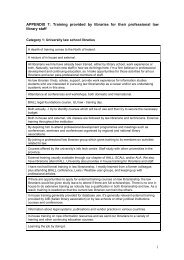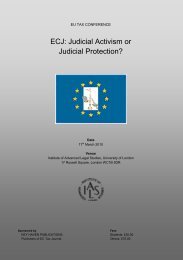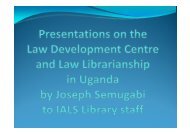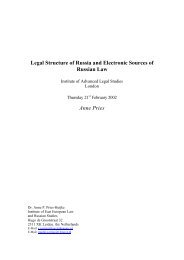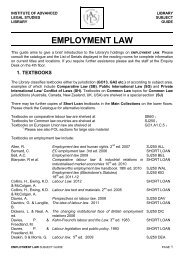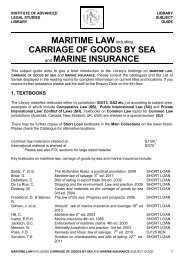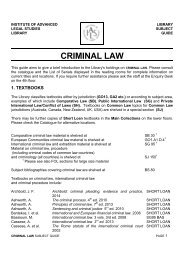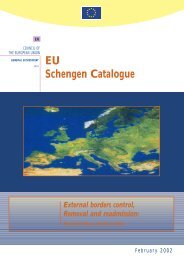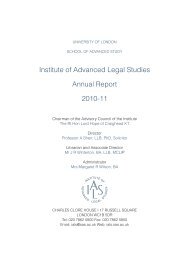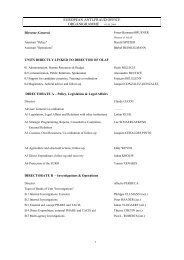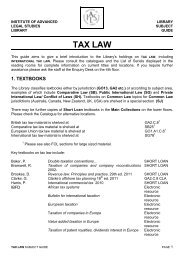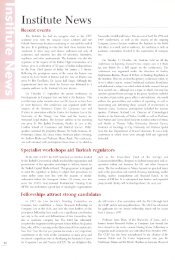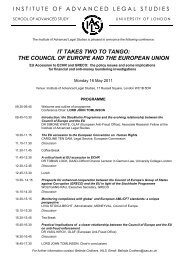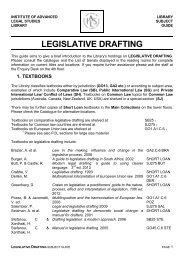a thesis - Institute of Advanced Legal Studies
a thesis - Institute of Advanced Legal Studies
a thesis - Institute of Advanced Legal Studies
Create successful ePaper yourself
Turn your PDF publications into a flip-book with our unique Google optimized e-Paper software.
34 EXPRESS TRUSTS.<br />
This does not create a trust in favour <strong>of</strong> B. Richards v. Dclbridge<br />
(1874), L. E. 18 Eq. 11.<br />
4. A., two years before his death, hands to his wife certificates<br />
for some railway stock standing in his own name, saying, " These<br />
are yours." This is not a declaration <strong>of</strong> trust by A., but an imperfect<br />
gift. Moore v. Moore (1874), L. E. 18 Eq. 474.<br />
5. A. signs a memorandum as follows:—" I wish to communicate<br />
to my executors that I have to-day given to B. my 1,000/.<br />
debenture bond <strong>of</strong> the M. S. & L. Ey. Co.; but as I shall require<br />
the annual dividends to meet my necessary expenses, I retain the<br />
document in my own possession for my lifetime, requesting you<br />
on my decease to hand it over to B. and communicate to the<br />
secretary <strong>of</strong> the said railway company at the Manchester <strong>of</strong>fice<br />
relative to the transfer <strong>of</strong> the said bond being entered in their<br />
books." This is not a declaration <strong>of</strong> trust, but an invalid gift, the<br />
reference being to 1,000/. debenture stock, transferable only in the<br />
books <strong>of</strong> the company. Pethybridge v. Burrow (1885), 53 L. T. 5.<br />
Not only must there be a clear indication <strong>of</strong> the settlor's intention<br />
to create a trust, but he must also indicate with reasonable<br />
certainty the trust property and the beneficiary. (Knight v.<br />
Knight (1840), 3 Beav. 172 ; Briggs v. Penney (1851), 3 Mac. & GK<br />
554.)<br />
Nearly all the cases in which the question <strong>of</strong> the certainty <strong>of</strong><br />
the trust property or <strong>of</strong> the beneficiaries has been raised are cases<br />
in which it has been sought to found the trust on precatory words.<br />
Under the modern view <strong>of</strong> such words, no trust would have been<br />
created in any <strong>of</strong> them, even if the trust property and beneficiary<br />
had been certain, so that they are not very satisfactory authorities.<br />
However, it is plain that in some such cases, at any rate, even if<br />
the precatory words had been the plainest words <strong>of</strong> trust, the trust<br />
would have failed for want <strong>of</strong> certainty <strong>of</strong> subject-matter or <strong>of</strong><br />
object. (Mmsoorie Bank v. Raynor (1882), 7 App. Gas. at p. 331.)<br />
Of these the following are examples :—<br />
Illustrations.<br />
1. A. devises real estate to B. and her heirs for ever, in fullest<br />
confidence that after her decease she will devise " the property " to



